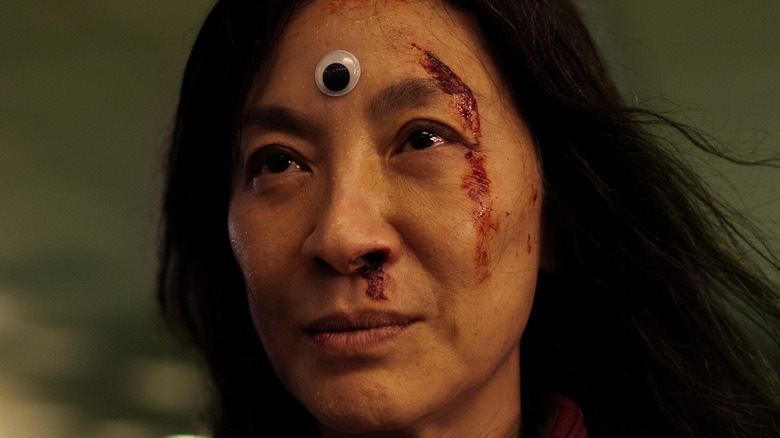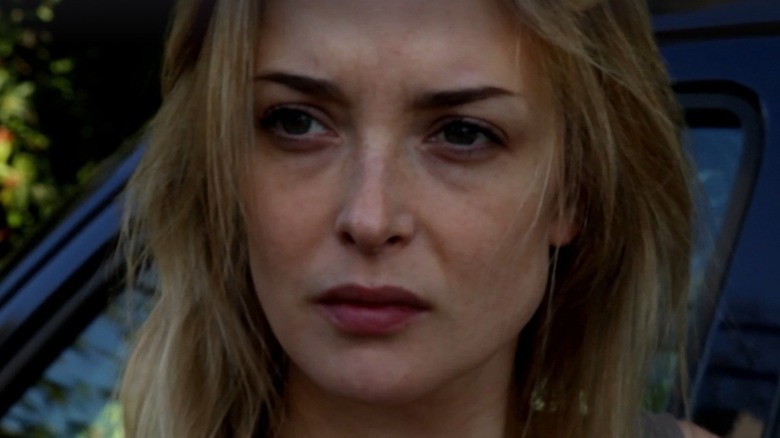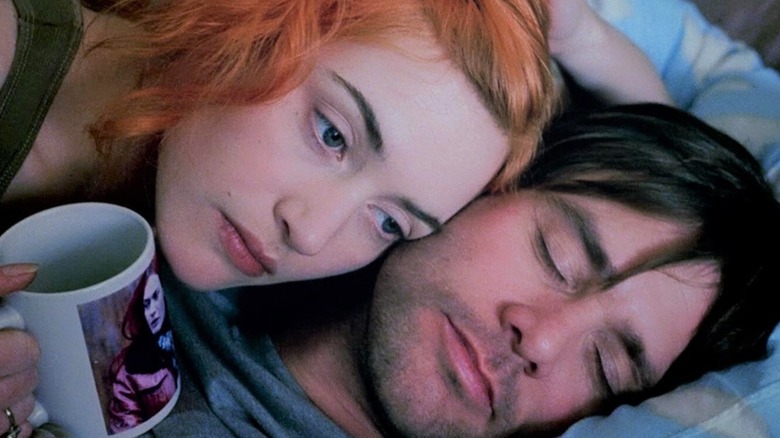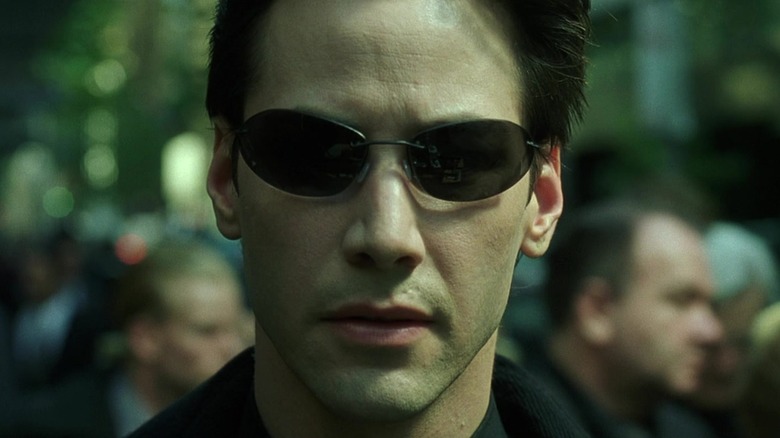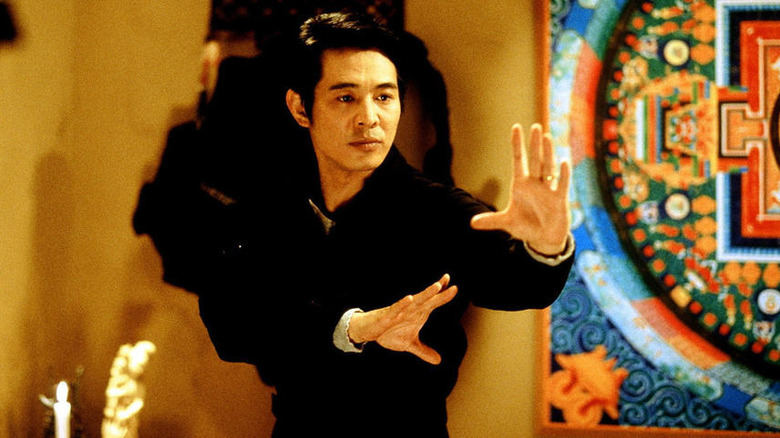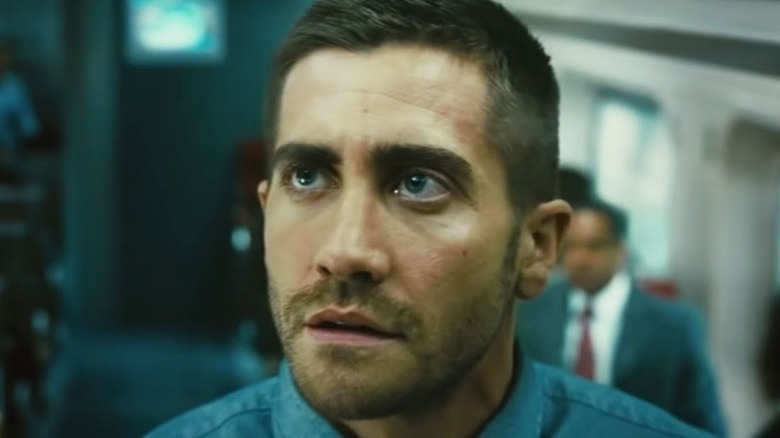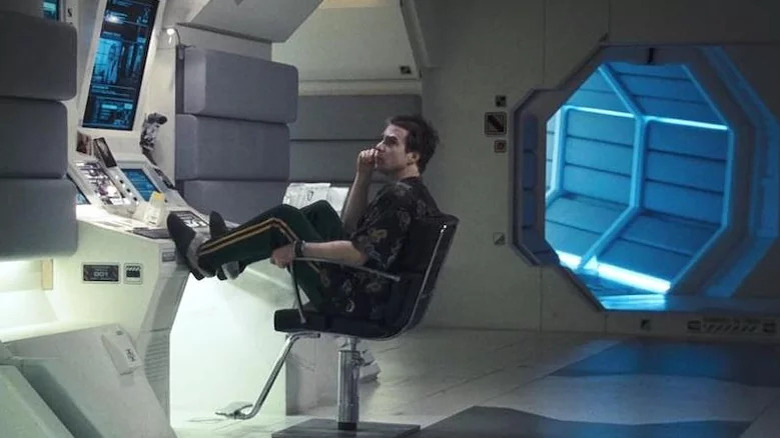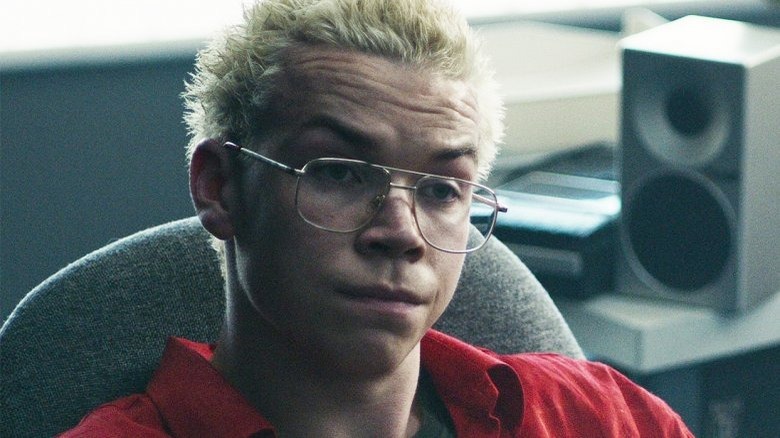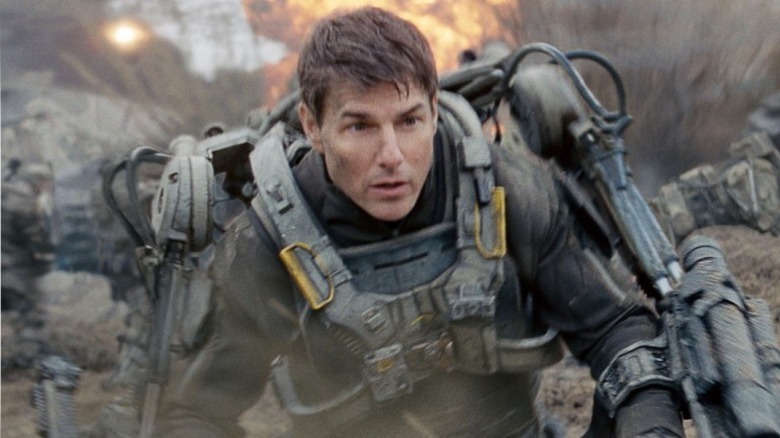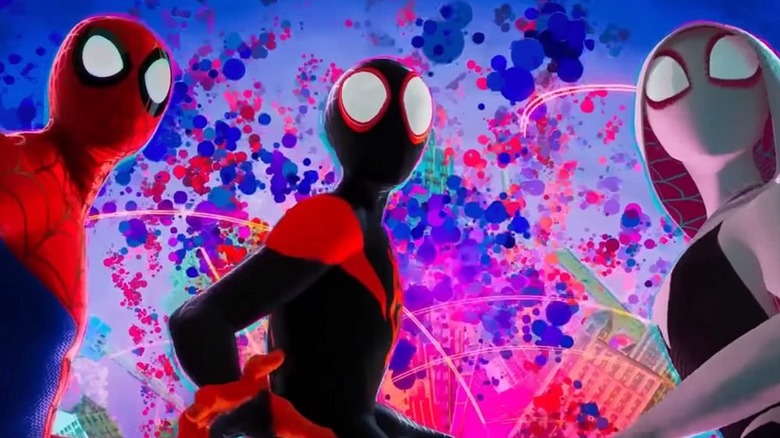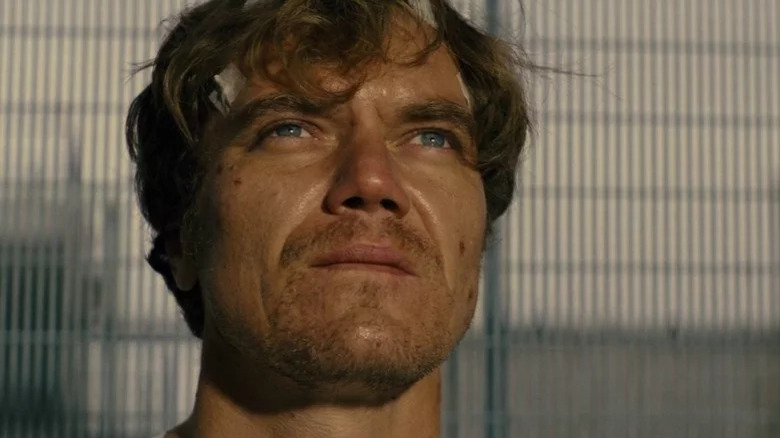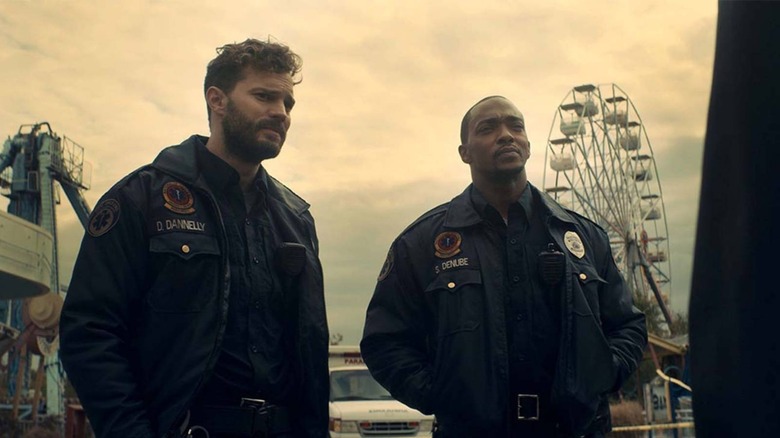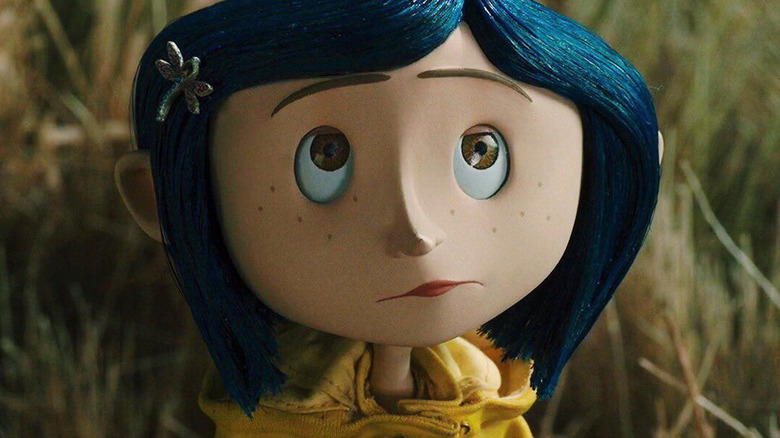12 Movies To Watch If You Loved Everything Everywhere All At Once
"Everything Everywhere All at Once" is the rarest of movies, its unique mixture of high science-fiction grounded by emotional storytelling about an immigrant family's multi-dimensional plight. Thrilling critics and audiences alike, it is a singular sensation.
It's a natural desire, when you love a film, to want to see more like it. But with "Everything," is that even possible? While it might be hard to find other films that wring high drama (and equally high comedy) out of talking rocks, everything bagels, googly eyes and hot dog fingers, it is possible to get similarly swept up in other stories of alternate worlds and how they might change the way we view our own.
These are sci-fi movies and shows with heart. Some offer fantastical action that rivals the epic fight scenes in "Everything Everywhere All at Once," while others are single location tales that show how expansive science fiction can make a small space feel. Whether you're looking for something mind-bending, life-affirming, or just, well ... cool, this universe is so much bigger than you realize.
Coherence (2013)
It's a little-seen film starring little-known actors, but this tale of a group of friends getting together for the first time in a long time to have a dinner party and watch the passing of a comet is the type of marvel that only passes through every few decades.
"Coherence" builds its tension in some of the friends being exes, with not everyone getting along at all times. As the comet passes and the entire neighborhood (except for one house) loses power, things only become more tense. As the group inevitably gravitate towards the house with power, they discover a near-identical copy of the house in which they had gathered.
"Coherence" is a horror movie that leans into the horrifying uncertainty of realities colliding. How can you be sure a friend is really the person you know when they might be another reality's version? How can you navigate reality, when you aren't sure where yours ends and another begins? For that matter, how can you even know which you is you?
Taking the multiverse possibilities of "Everything" and transforming it into unsettling horror, "Coherence" is a great counterbalance.
Eternal Sunshine of the Spotless Mind (2004)
Nearly two decades before "Everything" writer/directors Dan Kwan and Daniel Scheinert probed the possibilities of alternate realities and the allure of choosing ignorance, the enormous talents of Michel Gondry and Charlie Kaufman took a rack at it. The result was an instant classic.
While "Everything" is a family-based comedy-drama that just so happens to be a high concept science fiction movie, "Eternal Sunshine of the Spotless Mind" is a romantic drama in the skin of a high concept science fiction movie. "Sunshine" details a company that allows people to have selected passages from their memories erased; the concept is appealing to Jim Carrey's character, who decides to have all the painful memories of his ex (Kate Winslet) exorcised. But what will that do to his overall take on the reality of his surroundings?
While "Sunshine" sometimes traffics in the same silliness that "Everything" offers (Carrey's Joel moves through his memories, dating back to his childhood, trying to hide Clementine in memories she doesn't belong as he becomes increasingly desperate to hold onto her), there's a powerful romance here that makes it both spotless and flawless in the eyes of some.
The sincerity with which Joel and Clementine's relationship is depicted is rare in the realm of sci-fi, particularly in service to an overall point that dovetails well with the philosophies of "Everything": Life is about embracing both the good and the bad, appreciating the beautiful dance of the heartbreaking and awe-inspiring.
The Matrix (1999)
Any list of movies that reveal worlds beyond our own has to pay its respects to "The Matrix," the 1999 Wachowski film that had audiences asking themselves whether they'd take the red pill or the blue pill. In fact, it's nearly impossible to imagine the cubicle-set awakening of Michelle Yeoh's Evelyn without it.
The Keanu Reeves-led franchise has had a huge impact on not only other sci-fi movies but Hollywood more generally and even broader aspects of culture. Following an office drone (Reeves) yanked from his seemingly ordinary life and into a "matrix" underworld of criminals and authoritative secret agents, the film presents our entire reality as a fabrication. It was a mind-blowing proposition in 1999, presented in an incredibly stylish package of leather and bullet-dodging that delivered astounding action sequences.
It's hard to imagine anyone could see "Everything Everywhere All at Once" without having seen "The Matrix," but if you're out there, yeah, you should look this one up. Even if you're in the majority, well, it's never a bad film to revisit. Great action, multiple worlds, a focus on the relationships between the characters and how far they are willing to go for one another, it feels like a not-too-distant "Everything" cousin.
The One (2001)
Released two years after "The Matrix," it's easy to see how "The One" draws on that film's highly stylized action sequences, but "The One" is also an entirely singular film.
Possibly the best film Jet Li made (at least, among the American ones), it follows his Gabriel Yulaw as he makes his way through the multiverse and kills different versions of himself so he can become the only version of himself in the multiverse. For many moviegoers, it was their first introduction to the multiverse concept.
Unlike some multiverse stories, "The One" does not have infinite universes; when its story begins, Yulaw only has one version of himself left to kill to become the titular "One." That last version of himself is Gabe Law (also Li), who has become stronger and smarter by killing the other versions of them; both versions have been able to absorb the energy of the other versions of themselves that have died.
First and foremost, "The One" is a sci-fi action movie. Yet, many of its scenes play out like horror as Yulaw stalks Law in suspenseful scenes where it's hard to discern which Li is the good one and which is the bad. "The One" also features an early appearance from Jason Statham as one of the multiversal agents sent to stop Yulaw, alongside the always fantastic Delroy Lindo.
Fans of "Everything Everywhere All at Once" seem likely to enjoy the universe-hopping action story of "The One," as well as its surprisingly soft center, via the relationship between Law and his wife T.K., played by the always-solid Carla Gugino.
Source Code (2011)
"Source Code" begins when army pilot Colton Stevens (Jake Gyllenhaal) finds himself on a train without remembering how he got there; the train explodes moments later. But then he wakes up, is informed that he is participating in an experimental mission using something called "Source Code," and gets to try again.
The tech in "Source Code" uses memories of the dead bombing victims to create a unified picture of the world they collectively experienced for 8 minutes prior to the explosion. The hero's mission is to re-enter the source code continually, until he is able to find and identify the bomber and help his superiors stop him from committing further violence.
Directed by "Moon" helmer Duncan Jones, "Code" is a thrilling movie that offers multiple glimpses into how different timelines play out, depending on various decisions. But it's not until the film's finale that it becomes clear just how revolutionary the code is to relationships between realities.
Moon (2009)
Another film from Jones, "Moon" is not an ensemble like "Everything," but in its quiet, desperate, mind-bending moments, it is a kindred spirit.
Carried almost entirely by Sam Rockwell (as a lone attendant to a mining operation on the moon), it begins when his character is haunted by visions of a bearded man and a teenage girl who distract him from his work, leading to a near fatal accident. When he wakes up, he can tell that something is wrong, and his robot companion GERTY (voiced by Kevin Spacey) seems intent on keeping him in their station. Suffice it to say, GERTY might have some HAL-9000 in him.
"Moon" follows its haunted man as he works to discover exactly what is going on at the station, ultimately uncovering deeper mysteries whose answers only offer more questions. There's not much that can be said about "Moon" without spoiling it, but it's ultimately a movie about love, family, and the ways both can drive people to do incredible things in the face of absurd obstacles.
Black Mirror: Bandersnatch (2018)
"Black Mirror" has offered fans a variety of looks into worlds similar or parallel to our own, but the one "Everything" fans seem most likely to embrace is the experimental "Bandersnatch."
An interactive tale, the episode allows its audience to make decisions about what lead character Stefan (Fionn Whitehead) — who is working to adapt a "choose your own adventure" book into a video game — ultimately goes in his story. It's a riveting interactive opportunity that allows you to change the story, which itself comments on how a person can ultimately choose their own fate.
Essentially an experiential multiverse tale, there's a good chance many viewers will experience "Bandersnatch" in completely different ways. Yet, in all its forms, it tells a unique multiversal story.
Edge of Tomorrow (2014)
Better known by some as "Live. Die. Repeat." this Doug Liman film based on the novel "All You Need is Kill" by Hiroshi Sakurazaka was a rare Tom Cruise box office bomb upon release, but has come to gather a loyal following in the years since.
"Edge of Tomorrow" follows public affairs officer William Cage (Cruise), sent into battle against aliens who have invaded Earth. He suffers from a lack of experience and is killed — but then, he wakes up a few days earlier.
Cruise's character repeatedly attempts to speak with his superiors and warn them of impending attacks from the aliens, but is ignored and continues to experience the short loop without much change. Until he finds Sergeant Rita Vrataski (Emily Blunt), who believes he is experiencing time loops. She takes him to a scientist who explains that in his first death, he absorbed some of the blood of one of the aliens, allowing him to relive time over and over again until the outcome is changed; by absorbing this blood, the film's hero has also developed this ability.
Like "Source Code," "Edge of Tomorrow" shows the audience a number of different timelines, as well as the myriad ways the actions of Cage and Vrataski cause major changes to these timelines. "Edge of Tomorrow" is a fantastical movie, but its consideration of different timelines (and the ways relationships can change and grow in different directions within those timelines) makes it something fans of "Everything" need to check out.
Spider-Man: Into the Spider-Verse (2018)
There are more and more comic book (specifically, superhero) movies delving into the concept of the multiverse. The first to do it remains the best, and is nothing short of an animated masterpiece.
Employing eye-popping art from across dozens of mediums. "Spider-Verse" follows Miles Morales (Shameik Moore) who (in classic Spider-Man fashion) is bitten by a radioactive spider and begins to develop superpowers. But there's already a Spider-Man in Miles's world, and soon, there's more than one. Other Spider-people begin to appear from different universes, brought into this reality through a reality collapsing machine created by Kingpin (Liev Schreiber), who is desperate to bring his wife and son back to life.
"Spider-Man: Into the Spider-Verse" is perhaps the movie most like "Everything Everywhere All at Once," even if on the surface this animated tale couldn't look more different. Both films center on family (biological and chosen), both explore the multiverse with an equal sense of silliness and awe, and both value making the audience laugh without losing sight of the stakes. Both films also deal in visual inventiveness, to an unprecedented degree.
Midnight Special (2016)
Written and directed by Jeff Nichols, this under-the-radar cult hit has a solid cast (Michael Shannon, Kirsten Dunst, Adam Driver) and an equally impressive series of mysteries at its core.
When a father and son go on the run from a cult, desperate government operatives pursue the boy, who they believe has extrasensory powers. Alton (Jaeden Martell) has a number of abilities that can't be explained, including the ability to receive encrypted messages and telekinetically destroy physical objects. His father Roy (Michael Shannon) has rescued him from a cult that used Alton's powers to receive messages they say are from a divine entity.
Fans of "Everything" will appreciate the thematic focus on family, which extends to include mom Sarah (Kirsten Dunst); the flick also offers breathtaking sci-fi imagery, combining for a special movie that similarly manages to feel simultaneously small-scale and grand. Like "Everything Everywhere All at Once," "Midnight Special" has an incredible cast, a thoughtful script, and real emotion.
Synchronic (2019)
From writing/directing team Aaron Moorhead and Justin Benson (best known for Marvel efforts like "Moon Knight" and "Loki"), "Synchronic" follows two New Orleans paramedics (Anthony Mackie and Jamie Dornan) grappling with a new designer drug called "Synchronic." While that may sound like something of a police procedural, this is a film that has far more in motion.
The officers' calls, frequently leading them back to the drug, are often strange and inexplicable (someone bitten by a snake is no longer there; someone else is stabbed with a conquistador's sword), so they know something more is afoot. Eventually, one of them decides to buy it all, so that no one else can come to harm by using it. In doing so, he meets the man who created the drug, who tells him that the drug alters the pineal gland's perception, allowing people to essentially travel through time.
"Synchronic" is a movie that's about the lengths people will go to in desperation. "Everything" fans should enjoy the mind-warping twisting of times, the strange rules around how synchronic works, and the film's moving finale.
Coraline (2009)
Based on the novel by Neil Gaiman, "Coraline" follows a tween who discovers a parallel world after moving into a new house with her inattentive parents. Here, she encounters Other Mother and Other Father, parental doppelgangers with buttons for eyes, seemingly more caring.
As they lavish Coraline with all the attention and affection she could desire, finds herself increasingly drawn to them. But of course, things aren't so simple, and as Coraline discovers this other world isn't as perfect as it seems, horror elements come into play that makes the film sweet, scary and supernaturally endearing in ways only Gaiman could muster. The result is not just one of the best movies about alternate realities, but also one of the best stop-motion movies ever made; arguably, it's a perfect horror movie for kids.
"Coraline" explores the dangers of wishing for a life different from the one you have; "Everything" does the same, and both are ultimately about family and the love that can exist between flawed people seeking perfection. If you love "Everything Everywhere All at Once," it's well worth exploring.
